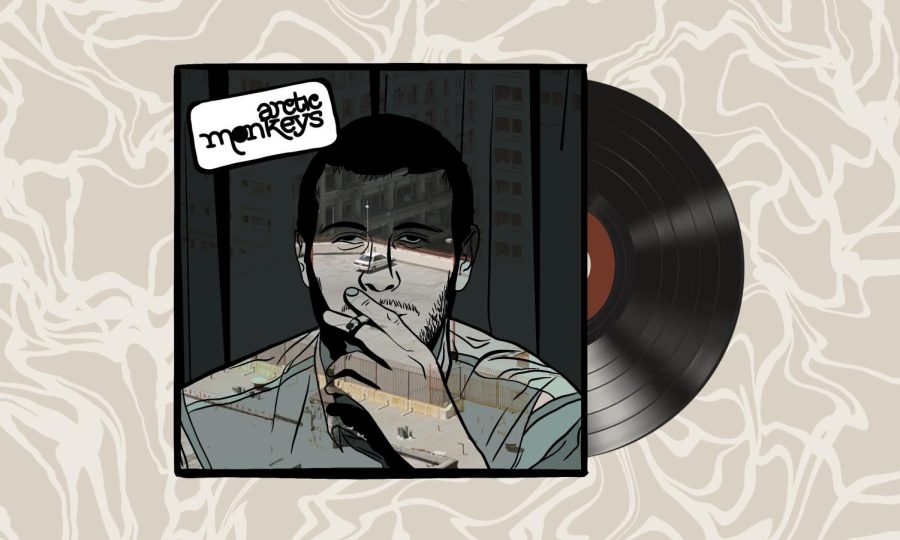Liner Notes: Arctic Monkeys don’t seem to care about the recession with “The Car”
The only reference to Arctic Monkeys’ early days in “The Car” is its similar emotion to the sullen-eyed chainsmoker on the cover of their debut studio album, “Whatever People Say I Am, That’s What I’m Not.”
October 27, 2022
Alex Turner, Arctic Monkeys’ frontman, must have learned a lot from fellow Brit and short-lived prime minister Liz Truss. Both seem to have egregiously miscalculated what people need to survive high inflation and economic pains.
You may have heard of “recession pop”: the TikTok-fueled theory that to subvert the current darkness of economic ruin, pop artists are developing upbeat music to transport their listeners to the club. Forget the melodrama of Hozier’s “Take Me to Church” — Beyoncé’s “CHURCH GIRL,” for example, will have you “drop it like a thottie” and party the pain away.
Casting aside the band’s roots in energetic punk rock, Turner catalyzes the counterculture to recession pop with “The Car,” the band’s newest album released last Friday. In just 10 tracks and 37 minutes, Arctic Monkeys somehow created a record more depressing than the economy’s upheaval.
There’s nothing wrong with the musical maturation of a band with a current median age of 36 that got huge when its members were teenagers. But from the band who had thousands screaming the bassline of “Brainstorm” at the 2007 Glastonbury Festival, I beg for some soul-lifting guitar riffs instead of haunting strings.
Like the artistic genius he is, however, Turner knew this would be my reaction to the album. The band, who once sarcastically quipped “Who The F–k Are Arctic Monkeys?” with their aptly titled 2006 EP, is self-reflecting. It’s a fitting theme for the band, who recorded the album in a converted monastery in rural England last summer. In “The Car,” the band is doubtful of their public and personal persona and, in true “AM” fashion, the meaning of love.
Kicking off a depressing album with — surprise! — a depressing tone is “There’d Better Be a Mirrorball,” but the album’s opener and lead single does little as either. Lead singles and openers typically excite a listener for what’s to come, but “There’d…” seems to have the aim of saddening them. Musically, the track leaves a lot to be desired in sleepy drums and strings, but thematically, the “mirrorball” focus signals at the self-reflection Turner winds through with buttery vocals.
Turner’s lyrics throughout “The Car” are a definite highpoint. Though lines such as “Lego Napoleon movie / Written in noble gas-filled glass tubes” take a bit of unraveling, their underlying meanings offer a glimpse into the psyche of the notably shy Brit.
“You’re getting cynical and that won’t do,” Turner sings on “There’d…”, pointedly both at his lover inside the song and the judgmental listener outside the song.
Bright spots in the album’s shadows are “I Ain’t Quite Where I Think I Am” and “Body Paint.” In the former, a short segue to funk, Turner croons “Blank expressions invite me to suspect I ain’t quite where I think I am,” likely referencing fans of the formerly punk rock band who fail to recognize it today. Likewise, “Body Paint,” the album’s other single, paints Turner as “a master of deception and subterfuge” atop lively orchestration and drums.
Reflecting on the album, Turner told British magazine The Big Issue, “If the idea was to do something that met these expectations, hypothetically, it’s hard for me to even know what that would be.”
Countered by the album’s reflections, Turner’s naivete resembles that of a teenager bent on doing the opposite of what they’re expected to do, or of a ragtag band of teens who shot to global fame for “Whatever People Say I Am, That’s What I’m Not.” Although Turner might claim not to know where he is, a return to his fun, rebellious rock roots is what we need.
Email: [email protected]
Twitter: @elenahubert25
Related Stories:
— Liner Notes: Taylor Swift meets us at midnight with “Midnights”


